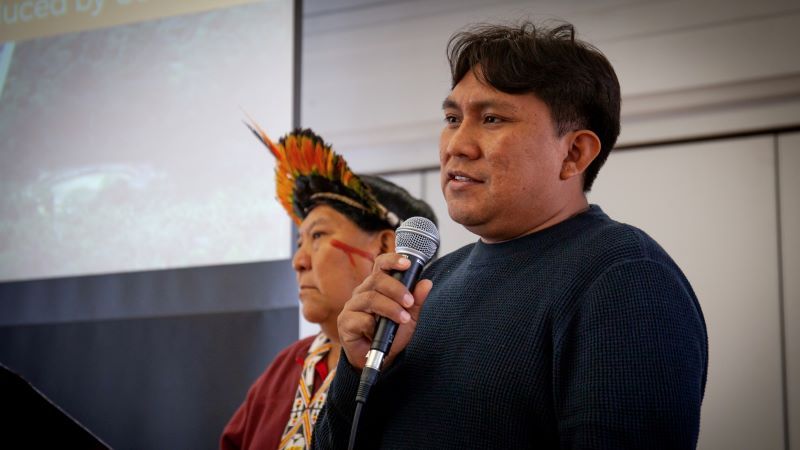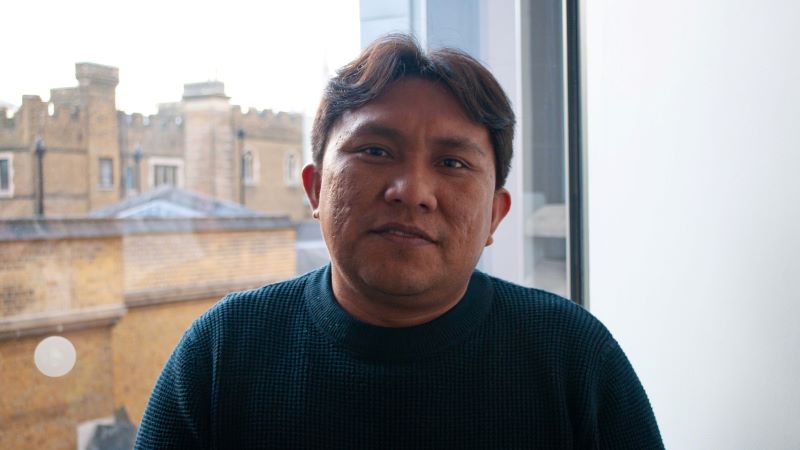Finding happiness through biodiversity

Friday 22 May is International Day for Biological Diversity. From his garden in London, CAFOD’s Ben Payne considers the wonders of our natural environment and the struggles of indigenous peoples around the world to protect our common home.
Nestled in the depths of South London, resting in the shadows of looming tower blocks, there is a small patch of grass. This is my garden.
Currently, I sit beneath an old, leafy tree. Vines swallow its trunk. Around me, wildflowers grow unchecked. I hear foxes furrowing in the undergrowth. Above me, squirrels jump from branch to branch and birds investigate – blackbirds, sparrows, great tits, goldfinches, robins and jays. They chirrup delightfully. The gentle hoot of pigeons is comforting. The squawk of lime-green parakeets is loud and proud. Bees buzz restlessly. Beetles scuttle across my shoes. Spiders weave glistening webs and dropped crumbs of biscuit bring the ants out in their multitudes.
Before lockdown began, I took this patch of grass for granted. Now, after many weeks in isolation, my garden has become a source of happiness. It is only little, but it is nature in abundance – wild and alive.
Sitting here, I think of Dario Yanomami.
Continuing a father’s fight for his people
Dario is the son of award-winning human rights defender, shaman and highly regarded indigenous spokesperson, Davi Yanomami. Dario’s father is sometimes described as the ‘Dalai Lama of the Rainforest’ – a leader of indigenous Yanomami across the rainforests and mountains of northern Brazil and southern Venezuela.
Dario is keen to follow in his father’s footsteps.
“I get inspiration from my dad. I associate with my father’s fight for the Yanomami people,” he tells me.
This fight is similar to the struggles of indigenous peoples around the world. Vulnerable communities are taken advantage of – resources plundered, homes destroyed, and natural environments devastated. This has certainly been the case for the Yanomami. Throughout recent history, they have suffered immensely.
From the 1940s onwards, countless incursions have bought few – if any – benefits. Missionaries unwittingly spread deadly disease; military governments and big business wiped entire villages off the map, all for the sake of convenient roads; an influx of garimpeiros (groups of artisanal miners) shot Yanomami on sight, razed villages to the ground, and exposed Yanomami to yet further diseases to which they had no immunity.
In just a seven-year period during the 1980s, one in five Yanomami were killed.
Finally, in the early 1990s, a group of garimpeiros entered Yanomami territory and slaughtered 16 people, including a baby. Brazilian courts found the garimpeiros guilty of genocide.
Find out how to support CAFOD’s work in Brazil
“Without the forest, we cannot live”
Despite Dario’s father’s incredible work in establishing Yanomami rights, violations – including murder – still take place. This is why Davi and Dario fight to protect their land.
“We don’t want to lose the richness of our culture. We have people from the city that want to cut down the forest. That is the philosophy of the city.
“People come and want to invade our land, to dig up gold, to destroy our forests, to raise cows and to grow more soya. It’s a real problem because it’s not in line with our Yanomami rhythm – the way that we live. We’re trying to protect the fantastic culture that we have. But it’s really hard to do when we have people invading.
“We are struggling and fighting against this so this doesn’t happen, so we can protect our rich culture.”

But what gives the Yanomami the strength to continue fighting in the face of such destruction?
It is nature, Dario tells me. It is the forest.
“It’s a fundamental space for us. We’re forest people. We’re connected to the land. We are born from the womb of the forest, surrounded by biodiversity. We know the movement of the forest, the sound of the birds, the sound of the water. We live together with the forest and the animals that live within it.
“We get all our food from the forest. Our houses are there, rivers are there. We grow our own vegetables and have different plots. The forest for us indigenous people, it’s a market.
“I make the comparison between the markets and the supermarkets that you have in the city. For us, the forest is that.
“We can’t stress enough how much the forest and the land is important. Without the forest, we cannot live.”
Find resources to reflect and respond to Laudato Si’
Defending our common home
During lockdown I’ve gained new appreciation for Dario’s feelings. The biodiversity of his rainforest is present for me too, even in my little London garden. It has given me great peace in these unstable times – a comforting reminder that, despite our human strains and stresses, lovely nature carries on regardless.
The thought of someone illegally entering my land and plundering it against my will fills me with anger. I can only imagine the anger and pain of the Yanomami people – a people who have suffered this way for decades.
I ask Dario how he copes with anger. What gives him hope? What makes him happy?
“Happiness is to be alive!” he says with defiant certainty. “When I am alive, I am happy.”
Friday 22 May is the International Day for Biological Diversity. It is a chance to acknowledge the wonders of our natural world – the fruit, the flowers, the fauna formed by billions of years of evolution – all the things that keep us healthy and alive, all the things that keep us happy.